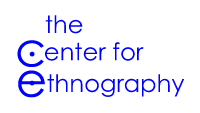
an
interdisciplinary
campus center
CRITIQUE IS OUT THERE: THE ETHNOGRAPHY OF REFLEXIVE KNOWLEDGE
These events explore the problems and opportunities for ethnographic inquiry of reflexively thinking about the contemporary knowledge predicaments of the disciplines that have promoted ethnography (anthropology, sociology, various interdisciplines) alongside those of the subjects of ethnographic inquiry itself. This emphasizes the affinities, identities, and common grounds from which 'data-producing' relationships are forged in the classic encounters across boundaries of difference and 'otherness' by which the doing of classic ethnography has been primarily imagined. Our concern is with current ideologies of research in which much more is desired by way of intellectual and conceptual labor in the process of fieldwork; the analytic account or results of inquiry are embedded in its doing. Far from leading to even more focused accounts of reflexivity and subjectivity in classic fieldwork encounters, this recognition and engagement with the reflexive subject and parallel problems of knowledge across topics and in various settings are as likely to lead to renewed concerns with the objects of ethnography, with objectification, and the difficult creation of the space/time of bounded inquiry.
In anthropology, these concerns have been most explicitly articulated in the effort to develop ethnography in the realms of science, technology, policy and expertise of various sorts, such as finance, law, medicine, and banking. But seen conceptually as the remaking of classic scenes of encounter that have defined ethnographic fieldwork, they have more general implications for most projects of ethnography that define themselves in the contemporary dominated by emergent conditions of some sort. That is, they are as relevant to the study of the politics of survival and negotiation of refugee communities in relation to sovereignties of international humanitarian efforts, for instance, as they are to the study of labs, board rooms, and conferences.
What sorts of relationships generate data now? What are the forms of data now? What are the bounds of ethnography and fieldwork in such projects located at sites of reflexive knowledge making? What becomes of critique? What distinctive forms of writing, reporting, and concepts might such projects generate?
We invite you to think with us about the range of events that we could organize around this theme.



